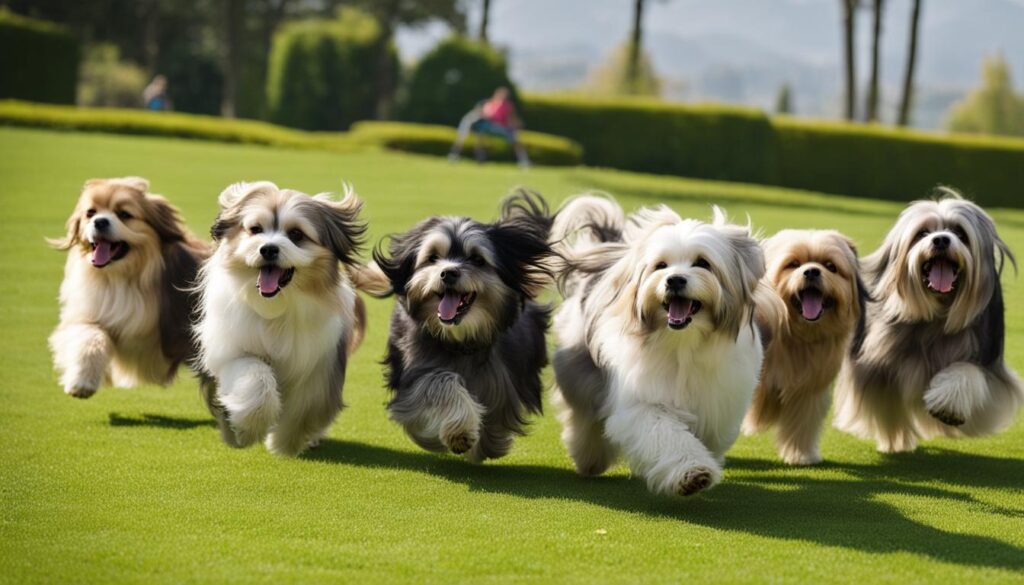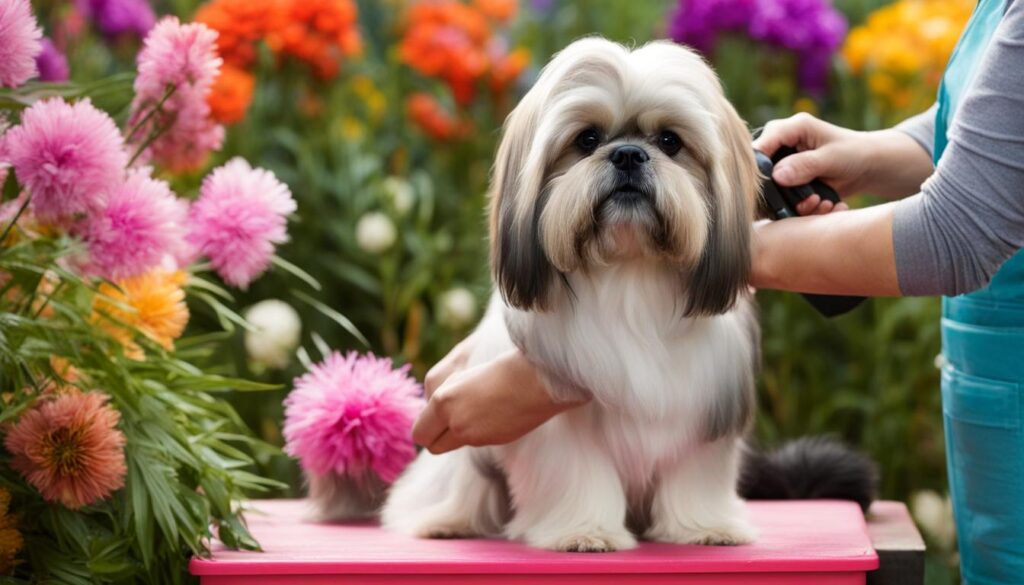Welcome to my guide on understanding the unique temperament of the Lhasa Apso, an ancient Tibetan breed with a loyal, independent, and playful nature. In this article, we will explore the history, origin, and personality traits of the Lhasa Apso, shedding light on what makes them such special companions.
Key Takeaways:
- The Lhasa Apso is an ancient Tibetan breed known for their distinct temperament.
- They are loyal, independent, and playful, making them unique companions.
- Their history and origin can be traced back over a thousand years to Tibet.
- Lhasa Apsos have an alert nature and make excellent watchdogs.
- While reserved with strangers, they are incredibly loyal and affectionate towards their families.
History and Origin of the Lhasa Apso
The Lhasa Apso is a fascinating breed with a rich history and a captivating origin. This ancient Tibetan breed has been treasured for over a thousand years, tracing its roots back to the capital city of Lhasa, from where it takes its name.
Throughout history, Lhasa Apsos were highly valued in Tibetan monasteries and palaces, where they served as loyal companions to Buddhist monks and nobles. Their majestic long coat, reminiscent of the mountain goats that roamed the rugged terrain of Tibet, added to their unique charm.
These small, sturdy dogs were not only cherished for their companionship but also revered as protectors. Their alert nature and sharp senses made them excellent watchdogs, guarding their human companions and their sacred spaces.
Discovering the Roots of the Lhasa Apso
To understand the true essence of the Lhasa Apso, it is essential to delve into its rich history and explore its ties to Tibetan culture. The Lhasa Apso’s origins can be traced back to ancient times, where they were believed to possess spiritual significance. They were considered sacred and were often given as gifts to esteemed guests.
It wasn’t until the early 20th century that Lhasa Apsos were introduced to the Western world. They quickly gained popularity for their unique appearance and charming personalities. Today, Lhasa Apsos continue to captivate the hearts of dog lovers around the globe, retaining their regal presence and unwavering loyalty.
Next, we will explore the independent and alert nature of Lhasa Apsos, shedding light on their distinctive temperament and the qualities that make them such remarkable companions.
Independent and Alert Nature of Lhasa Apsos
Lhasa Apsos are fascinating dogs with a unique temperament that sets them apart from other breeds. Their independent nature and sharp alertness make them captivating companions. As an owner of a Lhasa Apso, I have experienced firsthand their intriguing personality traits.
One of the defining characteristics of Lhasa Apsos is their independence. They have a strong sense of self and are not overly needy or clingy. While they form deep bonds with their families, they also value their alone time. This independent streak can sometimes be mistaken for aloofness, but in reality, it reflects their self-assured nature.
Alongside their independence, Lhasa Apsos are incredibly alert and vigilant. They possess an innate ability to sense any potential danger or unusual activity in their surroundings. This makes them excellent watchdogs, as they are quick to sound the alarm when they detect something out of the ordinary. Despite their small size, they are not easily intimidated and will fearlessly protect their family.
Sharp instincts and watchful eyes
With their sharp instincts and watchful eyes, Lhasa Apsos are always on high alert, making them an ideal choice for those seeking a reliable and vigilant companion. Their alertness is not accompanied by unnecessary barking, as they are thinkers and prefer to assess situations before acting. This discerning nature makes them great companions for individuals and families alike, as they are both independent and protective.
Furthermore, Lhasa Apsos’ independent and alert nature should be respected and nurtured through proper training and socialization. By providing them with positive experiences and exposure to different environments, we can help them develop into confident and well-rounded dogs. Understanding their independence and encouraging their alertness will ultimately result in a harmonious and fulfilling relationship with these remarkable canines.
Loyalty to Their Families
When it comes to loyalty, Lhasa Apsos are unmatched. These adorable dogs have a deep sense of devotion and affection for their families, making them incredibly loyal companions. Whether it’s a single individual or an entire household, a Lhasa Apso will form a strong bond and become a faithful and loving member of the family.
This loyalty is evident in their behavior and actions. Lhasa Apsos are known for their protective nature, always looking out for their loved ones. They will often alert their families to any potential threats or strangers, making them excellent watchdogs. Despite their small size, they will not hesitate to defend their family if they sense danger.
Furthermore, Lhasa Apsos have a special affinity for one particular family member, often choosing one person to be their ultimate companion. This bond is incredibly strong, and they will go to great lengths to please and comfort their chosen person. Whether it’s cuddling on the couch, playing fetch in the yard, or simply providing a listening ear, a Lhasa Apso will be there for their loved one through thick and thin.
Unwavering Affection
In addition to their loyalty, Lhasa Apsos are incredibly affectionate dogs. They thrive on human interaction and love being in the company of their family members. Their affectionate nature is evident in their constant need for physical contact, whether it’s snuggling up for a nap or showering their loved ones with kisses.
Lhasa Apsos are known to be sensitive to their family’s emotions and can provide emotional support when needed. They have an uncanny ability to sense when their loved ones are feeling down or stressed and will do their best to offer comfort and solace. Their presence alone can bring a sense of calm and happiness to their family members.
With their loyalty and unwavering affection, Lhasa Apsos truly embody the meaning of man’s best friend. They are a cherished and beloved member of any family, bringing joy, love, and companionship to everyone they encounter.
Intelligence and Stubbornness in Lhasa Apsos
When it comes to intelligence, Lhasa Apsos are undoubtedly quick learners. Their ability to understand and respond to commands is impressive, making them highly trainable dogs. Whether you’re teaching basic obedience or advanced tricks, their sharp minds and eagerness to please will make the training process enjoyable.
However, it’s important to note that Lhasa Apsos also have a streak of stubbornness. They possess a strong will and may challenge authority if they feel it’s necessary. This stubborn streak can sometimes make training sessions a bit more challenging, requiring patience and consistency from their owners.
The Key to Successful Training
To successfully train a Lhasa Apso, it’s crucial to establish yourself as a confident and firm leader. They respond best to positive reinforcement methods, such as rewards and praise. It’s important to make training sessions fun and engaging, while also setting clear boundaries and rules.
Consistency is key when dealing with their stubborn nature. It’s important to be patient and persistent, providing clear and concise instructions. By maintaining a calm and assertive demeanor, you can effectively navigate their strong-willed personality and achieve successful training outcomes.
Stimulating Their Minds
Aside from obedience training, it’s important to keep Lhasa Apsos mentally stimulated. They thrive on mental challenges and enjoy tasks that require problem-solving. Puzzle toys, treat-dispensing toys, and interactive games can help keep their minds sharp and prevent boredom.
Regular exercise is also essential for their overall well-being. Lhasa Apsos have moderate energy levels and enjoy daily walks or playtime. Providing them with physical and mental stimulation will not only keep them happy, but it will also help channel their intelligence in a positive way.
Compatibility with Older Children
When it comes to bringing a Lhasa Apso into a family, compatibility with children is an important consideration. While Lhasa Apsos can be great family pets, they tend to be more suited to households with older children who understand the importance of gentle play and respect for their small size.
Lhasa Apsos are generally patient and tolerant, but they may be less tolerant of rough play from very young children unless closely supervised. Their small size makes them more vulnerable to accidental injuries, so it’s crucial to teach children how to interact with them in a gentle and appropriate manner.
With proper socialization and training, Lhasa Apsos can form strong bonds with children and become loving companions. It’s important to educate children on how to handle and care for the dog, including the importance of not pulling on their long coat, respecting their personal space, and being mindful of their needs.
Tips for Introducing a Lhasa Apso to Children
1. Teach children to approach the dog calmly and gently, allowing the dog to initiate contact.
2. Demonstrate how to pet the dog gently, avoiding any rough or aggressive movements.
3. Supervise interactions between the dog and children, especially during playtime, to ensure the safety and well-being of both.
By following these guidelines, a Lhasa Apso can become a cherished member of any family, providing companionship and joy to both children and adults alike.
Importance of Socialization for Lhasa Apsos
When it comes to Lhasa Apsos, socialization plays a vital role in shaping their behavior and temperament. Early and consistent socialization is key to ensuring they grow up to be confident, well-rounded dogs. Socialization helps them become familiar with various people, animals, environments, and situations, minimizing the chances of fear, aggression, or anxiety in unfamiliar settings.
Introducing your Lhasa Apso to different sights, sounds, smells, and experiences from a young age is crucial. This can include exposing them to different types of people, such as children, elderly individuals, and individuals of various ethnicities. It’s also important to introduce them to different animals, both dogs and other species, to promote positive interactions and prevent territorial or aggressive behaviors.
Positive reinforcement techniques, like reward-based training methods and exposing them to new situations gradually, can help build their confidence and sociability. This can include taking them on regular walks, visits to dog parks, or enrolling them in obedience classes. Remember to always supervise their interactions and provide a safe, controlled environment.
Building a Sociable and Confident Lhasa Apso
By prioritizing socialization, you can help your Lhasa Apso become a sociable and well-adjusted companion. A well-socialized Lhasa Apso is more likely to greet strangers with curiosity rather than suspicion, and they are less likely to exhibit anxious or aggressive behaviors. Additionally, a properly socialized dog is more enjoyable to be around and can be taken on outings or gatherings without causing stress or disruption.
Remember to continue socializing your Lhasa Apso throughout their life. An ongoing effort ensures they remain comfortable and relaxed in various situations and environments. Regular socialization is an investment in their future happiness and well-being. With a well-socialized Lhasa Apso, you can enjoy the company of a friendly, confident, and sociable companion for years to come.

Adapting to Apartment Living
Living in an apartment doesn’t mean you can’t enjoy the company of a Lhasa Apso. These charming dogs are well suited for apartment living due to their small size and moderate energy level. Their adaptability makes them perfect companions for urban dwellers seeking a loyal and affectionate pet.
While Lhasa Apsos may not require a large backyard to run around, it’s important to provide them with daily exercise to keep them mentally and physically stimulated. Regular walks, play sessions, and interactive toys are beneficial for their well-being. Additionally, Lhasa Apsos excel in agility training, which can be conveniently practiced at local parks or specialized facilities.
Even though Lhasa Apsos are well suited to apartment living, they still require regular grooming to maintain their long, flowing coats. Ensuring their coats are free from tangles and mats is essential for their comfort and overall health. Regular grooming sessions can also become enjoyable bonding moments between you and your furry companion.
Potential for Dominance in Lhasa Apsos
When it comes to Lhasa Apsos, their small stature can sometimes be deceiving. Despite their size, some individuals of this breed may exhibit dominant behaviors, particularly when interacting with larger dogs. It is essential for owners to be aware of this potential for dominance and take appropriate measures to address it.
Establishing leadership and setting clear boundaries from the beginning is crucial in preventing any dominant tendencies from developing into problematic behavior. Consistent and positive training methods, along with socialization, are key in shaping a Lhasa Apso’s behavior and promoting good canine manners.
It is also important to remember that every Lhasa Apso is unique and may display different levels of dominance. Some individuals may be more naturally submissive, while others may have a stronger inclination towards asserting their dominance. Understanding and respecting their individual temperament is essential for successful ownership.
Exercise and mental stimulation
Providing adequate exercise and mental stimulation is crucial for Lhasa Apsos. Regular physical activity helps release pent-up energy, reducing the likelihood of behavioral issues arising from frustration or boredom. Engaging them in play sessions, obedience training, and puzzle toys can keep their minds stimulated and prevent negative behaviors associated with dominance.
Professional guidance
If you are concerned about your Lhasa Apso’s dominant behavior or need guidance on establishing a healthy hierarchy within your household, seeking the help of a professional dog trainer or behaviorist can be beneficial. They can assess your dog’s specific needs and provide personalized training plans to address any dominance-related issues.
Grooming and Care for Lhasa Apsos
Grooming plays a crucial role in the care and well-being of Lhasa Apsos. Their long, flowing coat requires regular maintenance to keep it healthy and free from tangles and mats. It is recommended to brush their coat daily or at least a few times a week to prevent the hair from becoming matted. Additionally, regular bathing is necessary to keep their coat clean and smelling fresh.
When grooming your Lhasa Apso, it’s important to pay attention to their ears and eyes. Their ears are prone to infections, so they should be checked regularly for any signs of redness, discharge, or foul odor. Cleaning their ears with a veterinarian-approved solution can help prevent ear problems. Similarly, their eyes should be inspected for any signs of redness, discharge, or irritation. If necessary, gently wipe their eyes with a clean and damp cloth.
In addition to grooming, proper care for Lhasa Apsos includes regular veterinary check-ups. Routine visits to the veterinarian ensure that your Lhasa Apso remains in good health and helps detect any potential health issues early on. Vaccinations, dental care, and parasite prevention should also be included in their care regimen to keep them healthy and happy.
<!–
Grooming Tips for Lhasa Apsos
Grooming your Lhasa Apso can be a bonding experience and a way to maintain their beautiful coat. Here are some additional tips to make grooming sessions easier:
- Start grooming your Lhasa Apso from an early age to get them accustomed to the process.
- Use a slicker brush or a comb with wide teeth to gently remove tangles and mats.
- Consider trimming their coat shorter for easier maintenance, especially during hot summer months.
- Regularly trim their nails to prevent them from becoming too long and causing discomfort.
- Provide dental care by brushing their teeth regularly or using dental treats or toys.
–> <!–
<!–
Conclusion
Grooming and care are essential aspects of owning a Lhasa Apso. With regular grooming sessions and proper veterinary care, you can ensure that your Lhasa Apso stays healthy, comfortable, and happy. Remember to approach grooming with patience and care, turning it into a positive experience for both you and your furry friend.
–>
Conclusion
After exploring the fascinating history and unique temperament of the Lhasa Apso breed, it is clear that they make wonderful companions. As a proud owner of a Lhasa Apso, I have experienced firsthand their loyalty and affection. Their independent nature and sharp alertness make them excellent watchdogs, always keeping a keen eye on their surroundings.
The intelligence of Lhasa Apsos is impressive, although their stubborn streak can challenge even the most patient owners. However, with consistent training methods and a gentle approach, they can learn a wide range of commands and tricks. It is necessary to provide them with mental stimulation to keep their bright minds engaged.
The adaptability of Lhasa Apsos to different living environments, including apartments, is a significant advantage. Their small size and moderate energy level make them well-suited for urban living. They are equally comfortable in a cozy apartment or a spacious home, as long as they receive regular exercise and play sessions.
As a family pet, Lhasa Apsos can be compatible with older children who understand the importance of gentle play. Their deep bond with their families is evident, and they thrive in a loving and nurturing environment. With proper socialization, they become confident and friendly dogs, always eager to meet new people and furry friends.
So, if you are looking for a breed that offers companionship, loyalty, and adaptability, the Lhasa Apso is an excellent choice. Their history, unique temperament, and unmistakable charm make them a cherished member of any family.
FAQ
Are Lhasa Apsos good with children?
Lhasa Apsos can be great family pets, especially with older children who understand the importance of gentle play. They may be less tolerant of rough play from very young children unless closely supervised.
Do Lhasa Apsos require a lot of exercise?
Lhasa Apsos are well suited to apartment living due to their small size and moderate energy level. However, they still require regular exercise and play sessions to keep them mentally and physically stimulated.
Do Lhasa Apsos get along with other dogs?
Some Lhasa Apsos may display dominant behaviors, particularly towards larger dogs. Establishing leadership and setting boundaries early on is important for successful ownership.
How often do Lhasa Apsos need to be groomed?
Lhasa Apsos have a long, flowing coat that requires regular grooming to prevent tangles and mats. Regular grooming sessions also serve as bonding moments between the dog and the owner. Regular veterinary check-ups are essential for their overall health.
Are Lhasa Apsos suitable for apartment living?
Yes, Lhasa Apsos are well suited to apartment living due to their small size and moderate energy level. However, they still require regular exercise and play sessions to keep them mentally and physically stimulated.



